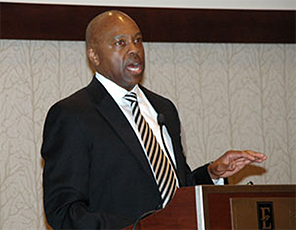School of Public Affairs co-hosts national public-private partnership workshop
Phil Washington, RTD general manager, delivers the keynote address at the Implementing PPPs for Colorado workshop on May 22.
Already a leader in public-private partnerships on transit projects, Colorado must keep that innovation moving forward because public resources for services and infrastructure continue to shrink.
That was a key message delivered at a workshop "Implementing PPPs for Colorado" at Embassy Suites Denver on May 22. The conference, which drew about 175 people, was organized by the Buechner Institute for Governance in CU Denver's School of Public Affairs and the National Council for Public-Private Partnerships.
John Buechner, former CU president and CU Denver chancellor, delivered introductory remarks along with current University of Colorado Denver Chancellor Don Elliman. Buechner said public-private partnerships are essential. "We need to improve them and leverage relationships. We need to discard unnecessary processes and procedures," he said.
Elliman said PPPs are the way forward in a state that has shown little appetite for raising the tax burden to fund services. For example, he said, multimodal transit will be essential to serve the rapidly growing Anschutz Medical Campus in the decades to come. The university was pleased when Kiewit Infrastructure Group and RTD suggested a PPP to drive a transit spur to the campus. "I can't tell you how much I appreciate the subject of this conference," Elliman said. "We're delighted to be a part of it. We hope, frankly, that you can move this ball forward because the state needs it."
Other workshop speakers included Steve Hogan, mayor of Aurora; Tim Harris, Colorado Department of Transportation, Gary Drews, Colorado Health Foundation; and Peter Binney, Merrick and Company.
Keynote speaker RTD General Manager Phil Washington said Colorado has the opportunity to be the "PPP capital in the country." The Eagle P3, which is building out 36 miles of Denver-area commuter rail with private-sector financial assistance and long-term operations, is unique in the nation.
Taking action is key to moving these infrastructure projects forward, Washington said. "We have to have intestinal fortitude and we have to keep doing it -- not keep talking about it," he said. "We have to execute innovation."
Randy Harrison, a senior fellow in the Buechner Institute for Governance, said government struggles to meet the state's infrastructure and service needs in health, education, transportation and other areas. "We're looking for new ways to work with the private sector in order to leverage resources and bring more resources to the table," he said.
Workshops such as this provide an opportunity for leaders to learn how others are making partnerships work. "They take a variety of forms, but it's the local governmental system that really is the foundation and gives us a wider range of choices and strategies to be more efficient and responsive," Harrison said. "This is a how-to. This is how you do it."


